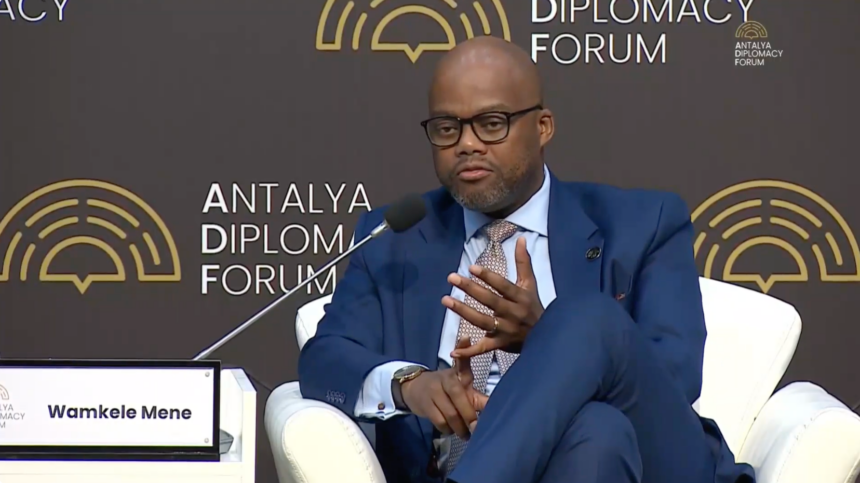George Sanzila
ANTALYA – The Secretary General of the African Continental Free Trade Area (AfCFTA) Wamkele Mene says Africa has begun to fast-track the development of its infrastructure. This is alongside harmonised trade regulations to attract investment and accelerate the continent’s economic development.
Mene said this during a panel discussion titled ‘Connecting Africa: A Prospect for Continental Integration’ at the 4th Antalya Diplomacy Forum in Turkey. The AfCFTA, one of the flagship projects of the African Union’s Agenda 2063, is a single-market trade agreement that removes trade barriers by creating the free flow of goods and services.
In addition, it facilitates investment and the movement of people and capital throughout Africa. Mene said the AfCFTA has been immersed in mobilising development finance to ensure that Africa readies itself.
“We are mobilising finance to build infrastructure that supports trade. Over the last five years, the African Development Bank has invested over 40 billion dollars. Since its establishment, the AFRIX Bank has invested over 20 billion dollars. It is, of course, not enough, so we have to mobilise more investment,” noted the secretary general.
He added that a harmonised regulatory framework has the potential to mitigate confusion and ease investor decisions. “The rules that we have developed establish a harmonised integrated market, which is the starting point. Investors want to see whether you have rules that create a single market, and rules that enable the resolution of disputes in a prescribed manner. These rules give investors confidence, and are considered when investors look for investment opportunities,” noted Mene.
He revealed during the discussion that Africa Heads of State recently adopted a protocol on digital trade. This initiative is a first of its kind in the world, which creates a single market for Africa’s digital economy.
This comes against the backdrop of the continent’s projected digital economy growing to over 720 billion dollars by the year 2050, the International Finance Corporation revealed. Digital economy refers to economic activities generated from the use of digital technology.
Mene stated that this will create endless opportunities, particularly for small and medium-sized businesses and the youth.
“This will create opportunities for young people that are innovative in the digital economy, as well as enable seamless payments across the continent and the movement of data,” said Mene.
Ugandan foreign affairs minister Jeje Abubakhar Odongo told delegates that the continent’s integration agenda has taken centre-stage.
“For us, integration comes a long way. Regional economic blocks are seen as building blocks for the process of integration of the entire continent. They are seen as transitory, and not an end in themselves as far as integration is concerned,” said Odongo.
The forum, hosted by Turkey’s foreign affairs ministry under the auspices of president Recep Tayyip Erdogan, attracted hundreds of delegates, including Heads of State, ministers, academics, diplomats and Members of Parliament, to re-evaluate diplomacy and find solutions to pertinent issues affecting the world.
It was held under the theme ‘Reclaiming Diplomacy in a Fragmented World’.
*George Sanzila works for the National Assembly in the Division: Research, Information, Publications and Editorial Services.



